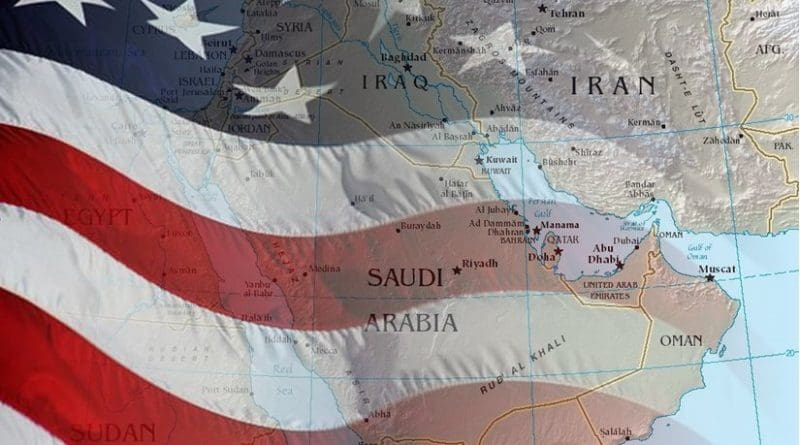Middle East De-Stability And The US – OpEd
The United States of America rose to preeminence on stage of world politics with a strong economy largely unaffected by World War II. Economic power spilled over into the military domain and the US became the strongest military power in the world assuming the leadership of the world with the conclusion of peace treaties formally ending the war of World War II.
The high moral stance that US took for entering the war, and the position of strength that she had made her the leader of free world. The US shaped the world order in her image and promotion of US values became part of US foreign policy discourse. The political capital that the US achieved for protecting and promoting values cherished by the common person greatly enhanced the soft power of the country.
Following the dictates of national security and Cold War politics, the US leadership justified the interventionist and expansionist policies to people back home and abroad that such polices were serving the greater cause of protecting the US and fighting the cronies of Communism abroad. Cooperating and promoting repressive regimes in the Middle East and Africa sowed the seeds of antipathy among the people of those countries who were suffering under regressive rulers propped by the US for skewed sense of security and desire to control petrochemical resources in these areas. Increasing self-sufficiency because of shale revolution means less reliance of US on Middle East for petrochemicals. This does not mean that the US will let go of the control of petrochemicals from these countries.
The emergence of radical and terrorist organizations in Middle East is fundamentally a reaction to the policies of the local elite that are supported by the ‘force for good’ in the world. The US’ illegal intervention in Iraq, according to international law, for the removal of a dictator was portrayed as inflicting consequences on countries that had links with terrorists who attacked the US on 9/11. The United States did not make the same mistake that Union of Soviet Socialist Republics (USSR) made by hastily exiting from Afghanistan after Geneva Accords were signed without establishing functional political structure. The US stayed, helped formulate a constitution and the establishment of a representative political setup.
The US intervention in Iraq disturbed the fine political balance in the Middle East through removal of a Sunni ruler and created a strategic opportunity for Iran to play an important role in making the US pull out of Iraq. The emergence of Islamic State of Iraq and Syria (ISIS) — which is neither Islamic nor a state — is a consequence of the political vacuum created in Iraq that spilled over to other countries of Middle East.
The removal of Saddam Hussain jumpstarted the proxy wars saga in Middle East. Efforts by the Saudi-led coalition for the removal of Assad in Syria are aimed at restoring the balance of Sunni rulers in Middle East. The Obama administration tried to play positive role for the resolution of Israel-Arab conflict by reinvigorating the peace process. Obama soon realized the difficulty for convincing Israeli political leadership for making meaningful progress for the eventual two state plan.
Defiant Benjamin Netanyahu, who targeted US Congressional support, challenged Obama’s foreign policy initiatives and dashed Obama’s hopes for some concrete advances for the resolution Arab-Israel dispute. Obama despite his liberal inclinations tasted the realist politics of Middle East.
For his part, Donald Trump has avoided including the resolution of the Arab-Israel conflict as part of his foreign policy agenda. During the recent visit of Benjamin Netanyahu, Donald Trump even gave up pursuing the two-state solution.
Donald Trump’s policy for countering ISIS in the Middle East is focused on preferring stability over democracy. His policy will bolster the cruel dictators, monarchs, and theocracy in Middle East. Rulers with hands tainted with blood of victims aspiring for dignified human life in Middle East will become strategically important for the US.
The US has long followed the policy of supporting dictators for its national security interests while giving lip service to human rights of the oppressed people of the Middle East. Only those regimes that have been removed are those — that through illegal interventions — that stopped towing the US line. It’s by the dual standards and depleting moral capital that other major powers have grown their sphere of influence in Middle East.
The US has performed badly when it comes to its responsibilities as the leader of the free world. Proxy wars will continue in the Middle East in the medium term while the US will use the excuses of terrorism and promotion of democracy for intervention in the Middle East, the price of such policies will be paid by the innocent people of the area and such causalities will be termed as collateral damage.
Wealth wasted on senseless interventionist wars by the US around the world is the real reason behind the relative decline of the US in international politics. The preservation of economic resources, respect for political system as per the culture of each Middle Eastern country and military restraint can extend the shelf life of the US’ leadership of the world.
* The author is doing MPhil Political Science from Government College University(GCU), Lahore, Pakistan. The author can be contacted at [email protected]

